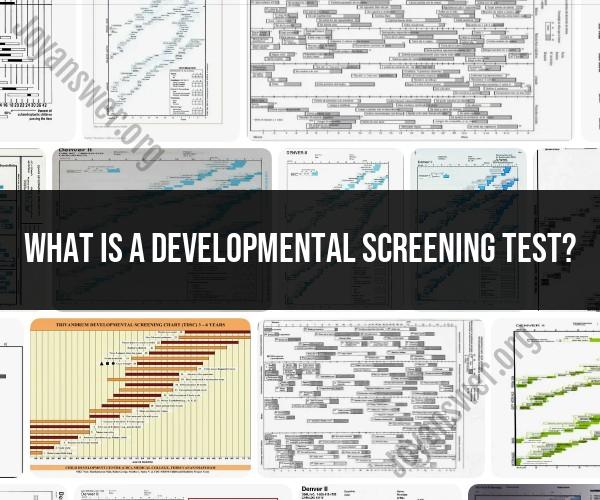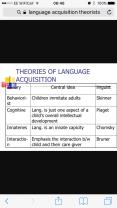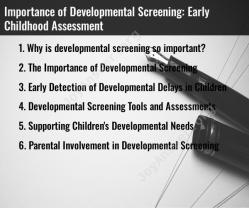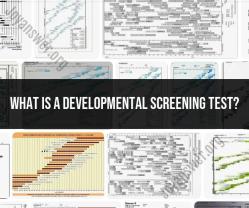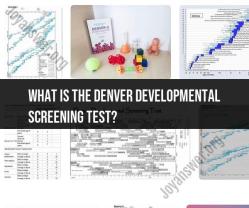What is a developmental screening test?
A developmental screening test, also known as a developmental assessment or screening tool, is a standardized and structured method used by healthcare professionals and educators to evaluate a child's developmental progress and identify potential developmental delays or areas of concern. These tests are designed to assess a child's physical, cognitive, social, emotional, and communication skills to ensure they are meeting age-appropriate milestones. Here are some key aspects of developmental screening tests:
Early Identification: The primary goal of developmental screening tests is early identification. By conducting these tests at specific ages or stages in a child's development, healthcare providers and educators can identify any signs of developmental delays or concerns that might require further evaluation or intervention.
Age-Appropriate Milestones: Developmental screening tests are based on established norms and age-appropriate developmental milestones. These milestones are generally categorized into areas such as gross motor skills, fine motor skills, communication, social and emotional development, and cognitive abilities.
Questionnaires or Observations: Developmental screening tests can be conducted using structured questionnaires filled out by parents or caregivers, or through direct observations by healthcare professionals or educators. Some screening tools incorporate both questionnaires and observations.
Scoring and Interpretation: The results of developmental screening tests are typically scored and interpreted based on established criteria. A child's performance is compared to typical developmental milestones for their age, and any significant deviations may raise concerns.
Follow-Up Evaluation: If a child's screening results suggest a potential delay or concern, a follow-up evaluation may be recommended. This more comprehensive evaluation is typically conducted by specialists, such as pediatricians, child psychologists, or early intervention specialists, and may involve more in-depth assessments and testing.
Timely Intervention: Early identification of developmental delays or concerns allows for timely intervention and support. Early intervention services, such as speech therapy, physical therapy, or educational support, can be provided to help address any identified issues and promote the child's development.
Regular Screening: Developmental screening is typically conducted at well-child visits with pediatricians and is a routine part of a child's healthcare. Screening may occur at specific ages, such as 9 months, 18 months, and 24-30 months, but can also be conducted as needed based on parental or provider concerns.
It's important to note that developmental screening tests are not diagnostic tools but rather a way to identify children who may benefit from further evaluation. They play a crucial role in ensuring that children receive the support and services they need to reach their full developmental potential. Regular developmental screening is a fundamental aspect of pediatric care and early childhood education. If you have concerns about your child's development, discussing them with your pediatrician is a good first step to determine if a developmental screening or evaluation is warranted.
Developmental Screening Test: A Critical Tool in Child Assessment.
Developmental screening tests are brief assessments that are used to identify children who may be at risk for developmental delays. These tests are typically administered by pediatricians or other healthcare professionals during routine checkups.
Developmental screening tests are important because they can help to identify delays early, when intervention is most effective. Early intervention can help children to reach their full potential and can improve their quality of life.
Understanding the Purpose and Process of Developmental Screening.
The purpose of developmental screening is to identify children who may be at risk for developmental delays. These delays can be in any area of development, including cognitive, social, emotional, and physical development.
The process of developmental screening typically involves asking parents questions about their child's development and observing the child's behavior and skills. The healthcare professional may also use a standardized developmental screening test.
Types of Developmental Screening Tests and Their Applications.
There are a variety of different developmental screening tests available. Some of the most common tests include:
- Ages and Stages Questionnaires (ASQ): The ASQ is a parent-completed questionnaire that is used to screen children for developmental delays from ages 1 month to 6 years.
- Parent Developmental Inventory (PDI): The PDI is a parent-completed questionnaire that is used to screen children for developmental delays from ages 2 months to 5 years.
- Denver Developmental Screening Test-II (DDST-II): The DDST-II is a standardized test that is administered by a healthcare professional. It is used to screen children for developmental delays from ages 1 month to 6 years.
The type of developmental screening test that is used will depend on the child's age and the healthcare professional's judgment.
Addressing Developmental Concerns and Delays Through Screening.
If a developmental screening test indicates that a child may be at risk for a developmental delay, the healthcare professional will typically refer the child for a comprehensive developmental evaluation. This evaluation will involve a more in-depth assessment of the child's development.
If a developmental delay is confirmed, the healthcare professional will work with the family to develop a plan for early intervention. Early intervention services can help children to reach their full potential and can improve their quality of life.
The Importance of Timely Developmental Evaluation in Children.
Timely developmental evaluation is important because it can help to ensure that children receive the early intervention services that they need. Early intervention can help children to reach their full potential and can improve their quality of life.
If you have any concerns about your child's development, be sure to talk to your pediatrician. They can help you to determine if your child needs to be screened for developmental delays.
